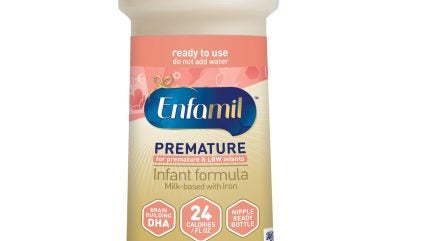
Reckitt Benckiser CEO Kris Licht has failed to rule out a potential split of its Mead Johnson infant-nutrition business amid ongoing litigation in the US.
Mead Johnson, which produces the Enfamil and Nutramigen formula brands, is facing the prospect of incurring as much as £2bn ($2.5bn) in damages related to the life-threatening necrotizing enterocolitis (NEC) disease, which effects premature babies.

Discover B2B Marketing That Performs
Combine business intelligence and editorial excellence to reach engaged professionals across 36 leading media platforms.
According to Barclays, which put forward the worst-case-scenario for damages in March, there are around 400 NEC cases pending in the US. The report followed Reckitt’s award of £60m to Jasmine Watson, the mother of a baby who died from the disease, after being fed Enfamil Premature 24 powder produced by Mead Johnson.
As Reckitt reported first-quarter group revenue of £3.7bn, Licht was questioned on an analyst call over the prospect of spinning off Mead Johnson, which sits within the company’s nutrition unit, the smallest of its three business areas.
“It is not prudent, I think, to speculate right now on structural moves that we may or may not consider,” Licht responded.
“We are spending a lot of time thinking about how to best navigate the litigation, how to prevail in the litigation, and we remain confident that we will prevail because the science is clear.”

US Tariffs are shifting - will you react or anticipate?
Don’t let policy changes catch you off guard. Stay proactive with real-time data and expert analysis.
By GlobalDataHe added in terms of any wider impact on the brand concerned: “We’ve had a few puts and takes from Nutramigen in and out so to speak of the market. So that would have caused the syndicated data to show a slight share decline early in the quarter and then a share recovery later, but effectively it’s stable.”
In March, the jury sitting on the Ms Watson case in the Illinois state court in St. Clair County reportedly found Mead Johnson was “negligent” because the company failed to warn mothers of the risks to premature babies from NEC as a result of consuming that type of infant formula producer by Reckitt.
“We are not seeing any wider impact on the equity of our nutrition brands from this litigation, Licht told analysts yesterday (24 April). “The science does not support a causal connection between any Mead Johnson products.
“We strongly reject any assertion that any of our products cause necrotising enterocolitis and that there was any failure to warn users of risk.”
Licht said litigation in respect of NEC claims is ongoing, including “post-trial motions on the Watson case and a new trial” scheduled for the 30 September in St. Louis, Missouri.
He added: “These near-term events do not change our overall outlook and we remain confident in our position. To reiterate what we have previously said Enfamil premature products are safe and provide life-saving nutrition for premature babies under the guidance of medical professionals who administer and specify our products.”
The nutrition division delivered first-quarter revenue of £591, representing a like-for-like decline of 9.9%, compared to a 1.5% increase for the group. Volumes for the unit were down 9.4%, with a negative price-mix of 0.5%.
However, Reckitt insisted the declines were due to the “continued rebasing in US nutrition”, linked to the elevated demand in 2022 from a general US shortage of formula as a knock-on effect of a recall by Abbott Laboratories.
“The drivers of the like-for-like revenue decline in the quarter are in line with what we communicated in February, as we continue to lap high market shares in the US driven by the competitor's [Abbott's] supply issue in 2022,” CFO Shannon Eisenhardt explained yesterday.
Reckitt, meanwhile, maintained its forecast that full-year nutrition sales will decline in the mid-single to high-single digit range. Group-wise, sales are expected to rise by 2-4%.





